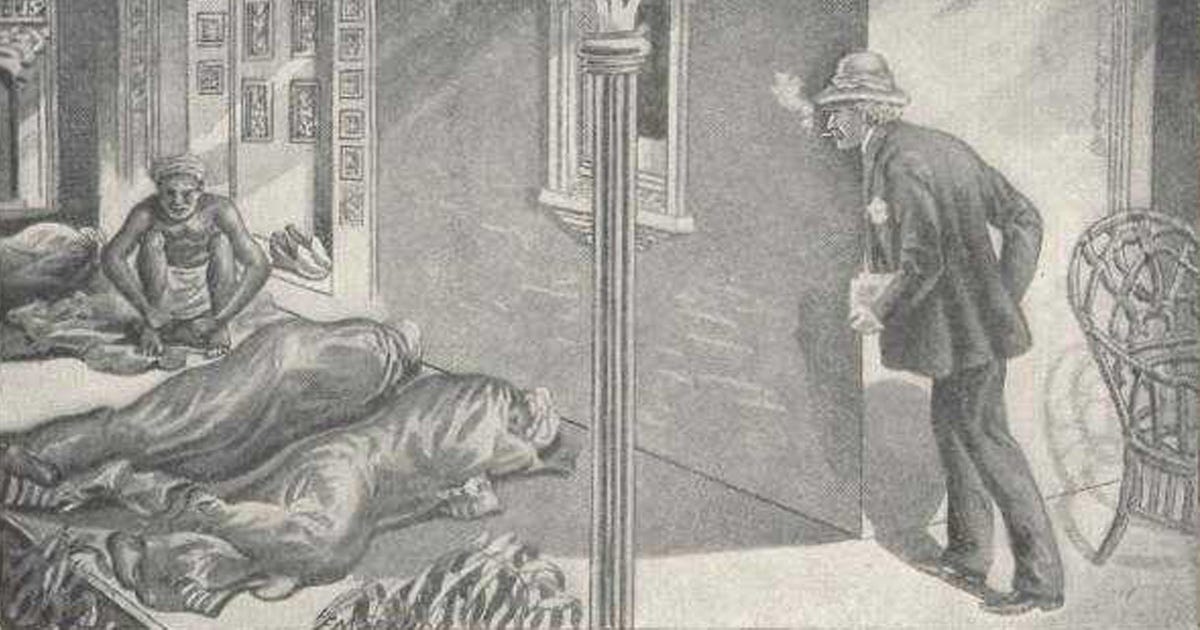“Jeldy Jow” by Mark Twain, 1896
"Whenever I read of Indian resignation, Indian patience under wrongs, hardships, and misfortunes, he comes before me."
Mark Twain describes his travels in India in Following the Equator, 1897.
I was up at dawn, the next morning. In India the tourist’s servant does not sleep in a room in the hotel, but rolls himself up head and ears in his blanket and stretches himself on the veranda, across the front of his master’s door, and spends the night there. I don’t believe anybody’s servant occupies a room. Apparently, the bungalow servants sleep on the veranda; it is roomy, and goes all around the house. I speak of menservants; I saw none of the other sex. I think there are none, except child-nurses. I was up at dawn, and walked around the veranda, past the rows of sleepers. In front of one door a Hindu servant was squatting, waiting for his master to call him. He had polished the yellow shoes and placed them by the door, and now he had nothing to do but wait. It was freezing cold, but there he was, as motionless as a sculptured image, and as patient. It troubled me. I wanted to say to him, “Don’t crouch there like that and freeze; nobody requires it of you; stir around and get warm.” But I hadn’t the words.
I thought of saying “jeldy jow,” but I couldn’t remember what it meant, so I didn’t say it. I knew another phrase, but it wouldn’t come to my mind. I moved on, purposing to dismiss him from my thoughts, but his bare legs and bare feet kept him there. They kept drawing me back from the sunny side to a point whence I could see him. At the end of an hour he had not changed his attitude in the least degree. It was a curious and impressive exhibition of meekness and patience, or fortitude or indifference, I did not know which. But it worried me, and it was spoiling my morning. In fact, it spoiled two hours of it quite thoroughly. I quitted this vicinity, then, and left him to punish himself as much as he might want to. But up to that time the man had not changed his attitude a hair. He will always remain with me, I suppose; his figure never grows vague in my memory. Whenever I read of Indian resignation, Indian patience under wrongs, hardships, and misfortunes, he comes before me. He becomes a personification, and stands for India in trouble. And for untold ages India in trouble has been pursued with the very remark which I was going to utter but didn’t, because its meaning had slipped me: “Jeldy jow!” (“Come, shove along!”)
From Following the Equator by Mark Twain, 1897, available on Amazon*
Classic Travel Tales on Facebook
More from Following the Equator
More travel stories from Mark Twain:
Mark Twain’s story “A Sleepless Night” from A Tramp Abroad (1880)
Mark Twain’s story “An Awkward Encounter” from A Tramp Abroad (1880)
Mark Twain’s story “By Train in India” from Following the Equator (1897)
Mark Twain’s story “Journey to Benares” from Following the Equator (1897)
Mark Twain’s story “Tarantulas on the Loose” from Roughing It (1872)
Mark Twain’s story “Lost in a Blizzard” from Roughing It (1872)
Mark Twain’s story “A Disturbing Incident” from Following the Equator (1897)
Mark Twain’s story “Athens by Stealth” from The Innocents Abroad (1869)
Mark Twain’s story “Carson City 1861” from Roughing It (1872)
Mark Twain’s story “Lake Tahoe” from Roughing It (1872)
Mark Twain’s story “An Archangel” from Life on the Mississippi (1883)
*As an Amazon Associate we earn a bit from qualifying Amazon purchases.
Image: “It Worried Me” from the first edition of Following the Equator by Mark Twain, 1897, public domain.



